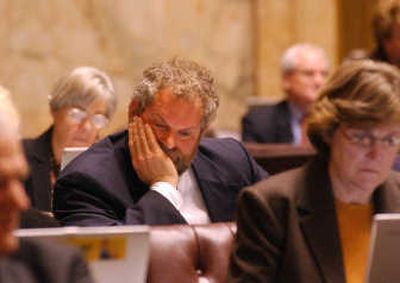Millions slated for projects in Spokane area

OLYMPIA – After weeks of negotiation, state lawmakers have settled on a supplemental budget, spending $390 million but leaving $836 million in savings.
Sen. Margarita Prentice, D-Renton, called it “a disciplined, frugal budget.” The House and Senate are on track to approve the plan before the 2008 legislative session ends today.
Meanwhile, a state construction budget released Wednesday adds $1.1 million for Spokane’s Mobius science center; $1 million for a joint YMCA-YWCA facility in the city; $300,000 for preconstruction work on the crumbling ski lodges at Mount Spokane; and $100,000 toward the proposed local Armed Forces and Aerospace Museum.
Not included, however, was $7.4 million sought by Washington State University for design work on a new veterinary research lab.
Among the budget changes lawmakers agreed to:
“Teachers and community college faculty will get half a percent added to their 2008 cost-of-living increase, which will now be 4.4 percent. The total is $57 million.
“Schools – thanks to heavy lobbying from several Spokane mothers and their supporters – will get $4 million more to pay for school librarians, books and computers. That works out to $4.09 more per student.
“Struggling students will get $18 million worth of help.
“Long-term care facilities, mental health programs and services for people with developmental disabilities will receive $27 million more. Spokane’s regional support network will get $2.3 million.
“The Confederated Tribes of the Colville Reservation and the Spokane Tribe of Indians would get a total of $6 million as part of a deal to draw down Lake Roosevelt slightly and provide billions of gallons a year to farmers, cities and fish in streams. The budget also includes $2 million for counties adjacent to the huge reservoir.
“State caseworkers in Spokane would launch an “integrated crisis response” program aimed at helping people with chronic substance abuse problems. The cost is $600,000. The program will be launched in May 2009.
“Affordable housing projects – particularly those involving mobile homes, low-income housing in Spokane or gentrifying neighborhoods in King County – would share $10 million in grants and loans.
“Smokers on Medicaid would get help quitting. Lawmakers set aside nearly $2 million for nicotine replacements and counseling. About 40 percent of the people on Medicaid, the state says, are smokers.
“Eastern State Hospital dodged a major cut. Lawmakers initially proposed cutting a $2.4 million technology project involving the facility, then changed their minds.
The budget also lays the groundwork for a state match for the federal earned income tax credit. The move would send tens of millions of dollars to low- and moderate-income working families, possibly as early as next year.
“God willing and the river don’t rise, we’ll have some money that we’re able to distribute” in the next two-year budget cycle, said Sen. Craig Pridemore, D-Vancouver.
Similarly, budget writers set aside $6.2 million to start setting up a system to provide $250-a-week payments to parents who take up to five weeks off from work to bond with new children, starting Oct. 1, 2009. The program was launched last year, although lawmakers have yet to figure out how to pay the tens of millions of dollars it’s expected to cost each year.
The budget allows several tax breaks, including $2.2 million for aerospace suppliers; $1.1 million for grocery cooperatives; $946,000 for newspapers’ online advertising; $324,000 for tidal-power projects; and $74,000 for beekeepers. But those tax breaks are tied to bills that may not pass before today’s adjournment.
Among the cuts: the $19.3 million Promoting Academic Success program, a tutoring program for 10th-graders who failed the WASL. A recent evaluation suggests it “has little or no effect on improved student performance,” according to a budget summary released Wednesday.
Lawmakers say they can also save nearly $16 million by shortening the WASL test. The test, however, remains in effect.